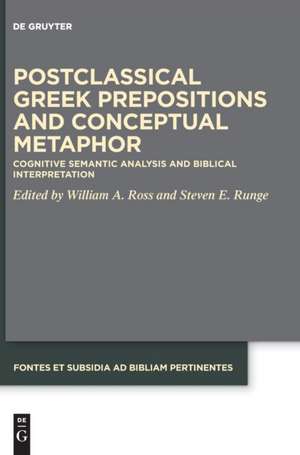Postclassical Greek Prepositions and Conceptual Metaphor: Fontes Et Subsidia Ad Bibliam Pertinentes
en Limba Engleză Hardback – 31 iul 2022
Preț: 771.98 lei
Preț vechi: 1002.57 lei
-23% Nou
Puncte Express: 1158
Preț estimativ în valută:
147.71€ • 154.64$ • 122.23£
147.71€ • 154.64$ • 122.23£
Carte tipărită la comandă
Livrare economică 05-19 aprilie
Preluare comenzi: 021 569.72.76
Specificații
ISBN-13: 9783110774047
ISBN-10: 3110774046
Pagini: 280
Ilustrații: 9 b/w ill., 7 b/w tbl., 20 col. ld, 11 col. graphics
Dimensiuni: 175 x 241 x 22 mm
Greutate: 0.71 kg
Editura: WALTER DE GRUYTER INC
Seria Fontes Et Subsidia Ad Bibliam Pertinentes
ISBN-10: 3110774046
Pagini: 280
Ilustrații: 9 b/w ill., 7 b/w tbl., 20 col. ld, 11 col. graphics
Dimensiuni: 175 x 241 x 22 mm
Greutate: 0.71 kg
Editura: WALTER DE GRUYTER INC
Seria Fontes Et Subsidia Ad Bibliam Pertinentes
Notă biografică
William A. Ross, Reformed Theological Seminary and Steven E. Runge, Grace School of Theology.








